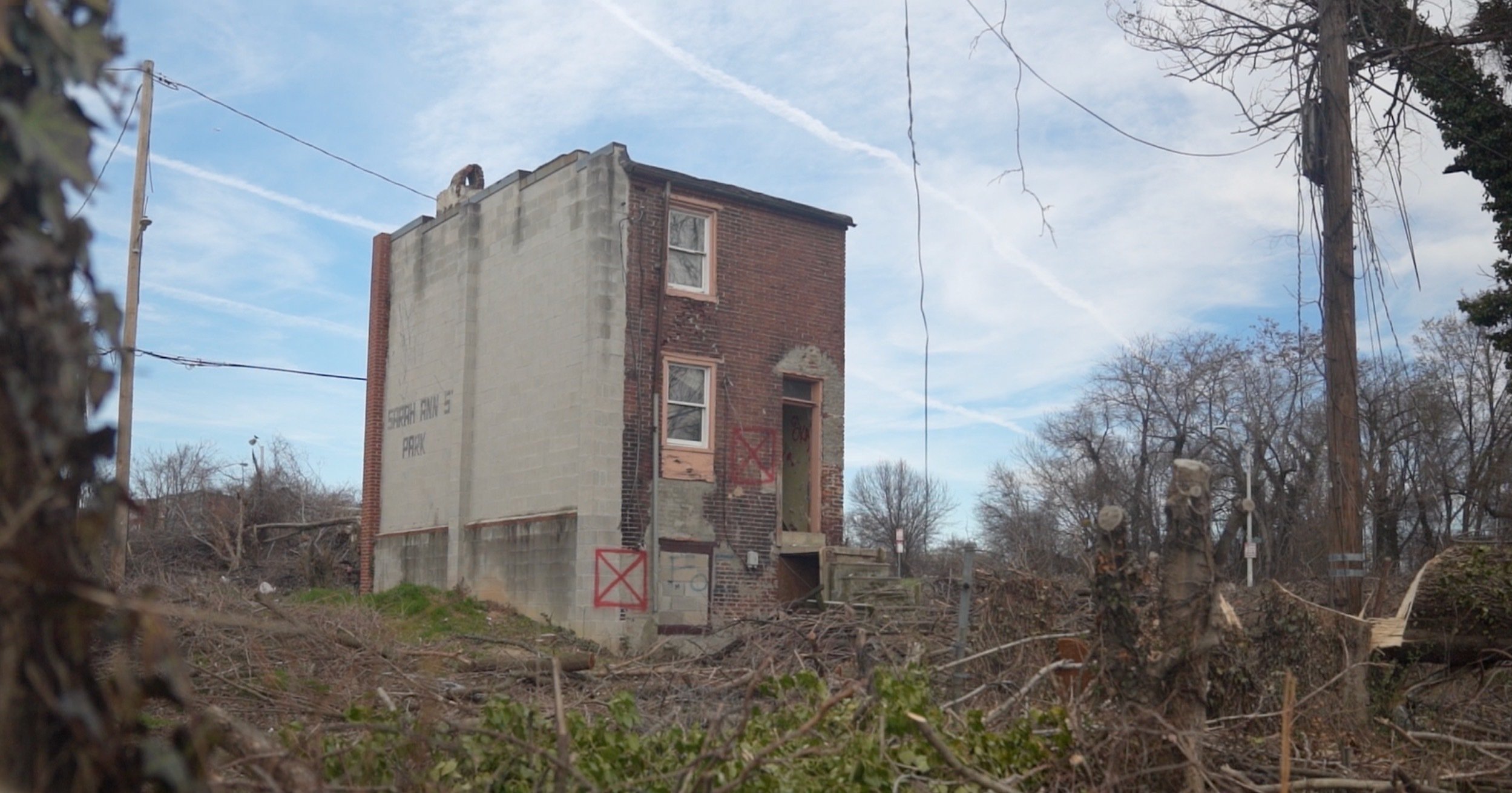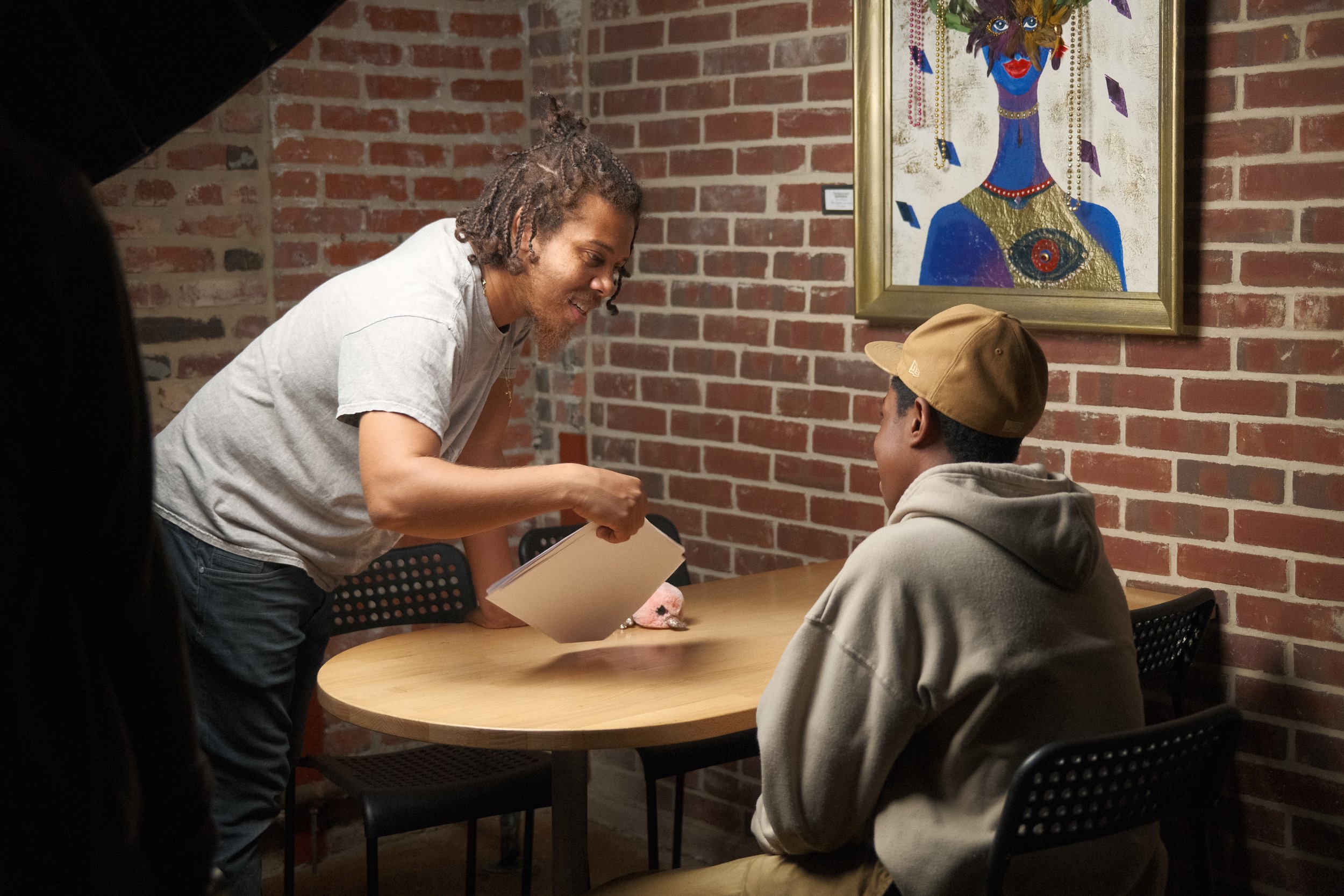FROM CLASSROOMS TO COMMUNITIES: INSIGHTS FROM DARIAN JONES ON STORYTELLING, SOCIAL JUSTICE, AND EDUCATIONAL IMPACT
Our media educators are impassioned creatives making a difference in our classrooms and our city. I recently had the privilege of sitting down with Darian Jones, our new Program Director (former Program Manager and Media Educator, and Arts2Work Apprentice), to discuss his latest storytelling project capturing the inspiring fight against eminent domain in Baltimore's Poppleton neighborhood.
First, what is eminent domain? In short, it’s when the government has the power to take private property and convert it into public use. Eminent domain is complex; however, it’s important to note that in many cases, it has disproportionately impacted marginalized and minoritized communities. According to a report published by the U.S. Commission on Civil Rights, between 1949 and 1973, eminent domain use displaced African Americans five times more often than their representation in the nation's population.
A home in the Poppleton neighborhood, that was scheduled for demolition.
Empty lot in the Poppleton neighborhood
Poppleton has been grappling with the repercussions of eminent domain for decades. Former Poppleton residents filed a complaint against Baltimore City officials, alleging violations of the Fair Housing Act by displacing Black residents with redevelopment projects since 1975. In July 2022, Poppleton resident Sonia Eaddy won a fight to transfer the ownership of nearly a dozen rowhomes to a community developer (Baltimore Banner). Darian worked with his mentor, Charles Cohen, to create a short film that highlights the community’s fight for justice and educates others about the importance of taking a stand against unjust eminent domain.
What challenges did you encounter during this project?
I think one of the biggest challenges - and this goes for any type of filming that you do in any community - is getting buy-in from the people who are actually in the community. It's tough when you are an outsider - and we're from Baltimore - but we do not specifically have roots in that community. It’s hard to establish those relationships and build trust in telling their story. I wanted the story to be authentic and I don't want to be the one controlling everything. I wanted it to come from the people who are on the inside.
Parcha and her daughter visit their former home, that was subjected to eminent domain.
How did you bring people into the filmmaking process and build that trust?
When they hosted Community Town Halls we went first without cameras and just took time to establish who we were. We shared why we were passionate about sharing their story and continued to just follow up with people who expressed interest. It’s also about learning to take no from people. It's a very delicate situation.
What are some takeaways for you from this project?
This project shows the impact that people can have on that community. It also shows how a community can come together and beat the odds, successfully standing up to any local government. One of the most powerful things that came from this experience was seeing that Sonia Eaddy is joining the council race for District 9 in 2024.
Are there any other social justice issues that you want to highlight through media-making endeavors?
I recently received a Grant from Arts2Work and NBC Universal to create a documentary about Pool No. 2 at Druid Hill Park. That was the only pool African Americans could swim in from the 1920s to the 1950s. Around the mid-1950s the pools were desegregated. About a year after the main pool was open for African Americans to swim in, Pool No. 2 was abandoned until 1999 when Baltimore artist Joyce J. Scott won a commission to turn it into a memorial.
Black people have a complex and complicated history with water, I’ve been pulling back layers doing research for this project. Similar events happened throughout the country, where we were able to go to the parks, but we weren't able to swim. Not being allowed to do something as enjoyable as swimming continues to put things in perspective for me, because growing up swimming was a very pivotal part of the summer for me and my cousins.
Darian leading our high school class, Video: Digital Storytelling, this spring. Students are shooting a scene for a short film.
Darian gives tips to a student actor for the scene.
How has being an educator impacted the way you go about your storytelling outside of the class?
Being an educator has helped me determine the type of stories I want to tell. I encourage my students to search for stories that aren’t being told or how they can be told differently. Everyone learns the same fundamentals of filmmaking. After that, it’s about using your perspective of different ideas, camera angles, and camera movement, to shape your project.
It helped me slow down when I'm on set, making sure I'm planning everything out. When I first started teaching I would sometimes skip steps and then I realized I needed to break this down for my students. It translates for me when I'm working with a client to make sure I break down every section from pre-production to production to post-production. This helps to set expectations for the project, people are coming to me for my skill set and my opinion.
During the interview, I pleasantly discovered that Darian was going to become the next Programs Director at Wide Angle!!! So I had to ask him one last question.
How are you feeling about stepping into the Program Director role and what are you looking forward to?
I'm definitely excited and I'm nervous at the same time. I'm excited because I think part of the reason why I took the position is I heard from the teaching staff that I would be a good director. I think the connections that I already have with the team allow for a level of honesty and transparency in terms of how we’re teaching inside the classroom and the impact that we are making. From that place, I’m looking forward to planning where we want to go and what new heights we want to take our classes to.
To learn more about Darian’s work check out his website: darian-jones.com
Meet the author
Hannah Shaw is the Communications Manager at WAYM. She is a multidisciplinary designer and received her BS in Marketing from UMD and MA in Social Design from MICA.







